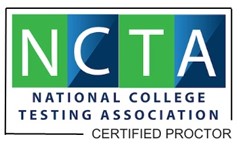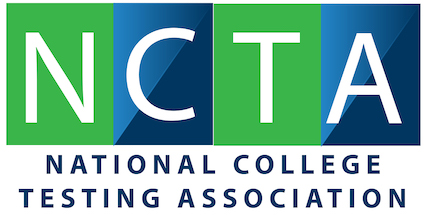Proctor Certification

NCTA is excited to announce the launch of the Proctor Certification Program! We are proud to offer this new certification in response to the industry's need for standardization of professional competency across sites, jurisdictions, and types of testing.
Why seek certification? Attaining the NCTA Proctor Certification can:
- Enhance the credibility of professional proctors by demonstrating they understand and adhere to proctoring best practices.
- Further the professional development of testing staff working in educational institutions and the private sector.
- Help to ensure the preservation and relevance of exam content for all stakeholders including test vendors, sponsors, and examinees.
- Provide opportunities for new proctoring training that is non-specific to a test program.
- Protect testing integrity by ensuring individuals understand industry standards and guidelines.
Ready to become NCTA Proctor Certified?
2026 Proctor Testing Windows and Important Dates
- June 1-26, 2026
- Registration Open: March 23, 2026
- Registration Deadline: April 30, 2026
- Accommodation Request Deadline: April 15, 2026
- October 5-30, 2026
- Registration Open: June 29, 2026
- Registration Deadline: September 3, 2026
- Accommodation Request Deadline: August 19, 2026
Registration Details
- Registration Fees: $150 NCTA Members, $200 Non-Members
- Payment for exam registration is due at the time of application and must be make via credit card. Only credit card payments will be accepted. Payment is valid for the specific testing window in which the application is submitted. The exam registration fees are non-refundable and non-transferable, including but not limited to to other individuals or test windows.
- Fee Payment Requirement: Fees are required for each test registration, including re-testing.
- Meazure Learning Rescheduling Policy: For detailed information on Meazure Learning rescheduling policies within a testing window, please refer to the Proctor Certification Handbook. Meazure Learning policies do not apply to the NCTA registration processes or fees.
- Note: ADA Requests must be received by NCTA no later than 45 days prior to the testing date.
NCTA's Terms of Service
Proctor Recertification and Continuing Education
- Visit NCTA Continuing Education and Proctor Recertification for CE information.
- To maintain the credential(s), the certification holder must meet the minimum requirement of 15 CEs for each three-year term. Payment of the $100 certification maintenance fee is due once your CE credit is approved at the end of the 3-year certification period.
- Certified individuals should self-report all activities within 90 days of the event to ensure documentation is still available. Reminder emails to submit CEs will be sent ahead of renewal period. To self-report, click HERE.
- Legal Name: When making your NCTA profile and completing your application, you must use your full legal name, including your middle name, as it shows on your official, unexpired, valid, government[1]issued ID. This is the official name that will be included on the certificate once you have successfully passed the exam. After making your profile and completing your application, you are responsible for informing NCTA of any errors or name changes. To change a legal name, follow these steps: contact the Proctor Certification Committee ([email protected]) to submit the name change request and include a scanned copy of a marriage license or a final court order signed by a judicial authority that changed your name. Regardless of any name change reflected on a marriage license or court order, your government-issued photo-identification must reflect your new name, as reflected on the marriage license or court order in order to change your name in connection with your NCTA profile, application and/or pending or existing certification. All documents must be officially issued, valid, and unexpired. If you already have an exam scheduled, you must submit the change request at least 20 business days prior to the exam. NCTA does not return documents. Please refrain from mailing or delivering any paper or hard- copy documents to NCTA – only digital images are accepted for these purposes. Please be aware that to sit for the exam, your government-issued ID must match the name on file with both NCTA and Meazure Learning
- Terms relevant to the above: The NCTA Candidate Agreement ("Candidate Agreement") is a legally binding contract between you and the National College Testing Association ("NCTA") that specifies the terms and conditions under which NCTA will permit you to sit for NCTA certification exams. Before registering for, scheduling, and taking an NCTA exam, you must read, acknowledge, and consent to the terms of this Candidate Agreement. If you disagree with the provisions of this Candidate Agreement, you will be unable to register for or take any NCTA exams. Adherence to the Candidate Agreement is essential for NCTA to conduct fair examinations, guarantee the validity of examination results, and maintain the integrity and value of NCTA professional certificates. By selecting the 'I AGREE' button at the conclusion of the Candidate Agreement, you attest to NCTA that all of the below representations and statements are true and accurate. You are also confirming that you have read, comprehended, and agreed to abide by the following requirements, rules, and policies. I certify that the name and address listed on my NCTA certification application, my registration for this NCTA exam, and the government-issued photo ID that I will submit or have presented in order to enter the examination are mine.
History
In 2018, an NCTA committee was formed to develop the first certification for professional proctors in the field. The committee completed Request for Information and Request for Procurement processes, leading to contracting with Meazure Learning to assist with the design and development of the Proctor Certification exam, along with providing test delivery. NCTA's mission includes "the promotion of professionalism and quality in the administration of testing services and programs." Proctor Certification, including the exam, continuing education opportunities, and recertification policy, represent a major step forward for the profession toward this goal. On completion of the exam development and candidate handbook, the program is now managed under the Professional Services Division.
Contact Information
Questions can be sent to the Proctor Certification team.
Resources
NCTA does not provide training to prepare for the exam. However, a non-exhaustive list of references used in the development of exam content is available here:
- American Educational Research Association, American Psychological Association, National Council on Measurement in Education. 2014. The Standards for Educational and Psychological Testing Washington, DC: American Educational Research Association. (available for free download).
- American Psychological Association. (December 2020). “The Rights and Responsibilities of Test Takers: Guidelines and Expectations”.
- Association of Test Publishers, National College Testing Association. 2015. Proctoring Best Practices. ATP, NCTA. (free to members, hardcopy can be purchased)
- Association of Test Publishers. (2015). ATP Security Survey Report
- Bristol, T. (2017). Test and Examination Security Technology. http://www.jtln.org/article/S1557-3087(17)30131-2/pdf
- Caveon: The Lockbox Blog (Available: https://caveon.com/insights/), including:
- David Foster, PhD, CESP, CEO, Caveon Test Security. Caveon: The Lockbox Blog - Are Proctors Deterrents. Feb. 2022. https://thelockbox.readz.com/are-proctors-deterrents.
- Gregory J. Cizek. 1999. Cheating on Tests: How to Do It, Detect it, and Prevent it. Mahwah, New Jersey: Lawrence Erlbaum Associates, Inc.
- College Board. (2024) Spring 2024 SAT Suite of Assessments Test Coordinator Manual (collegeboard.org)
- P. Ericsson & R. Haswell (eds.). Machine Scoring of Student Essays: Truth and Consequences
- HESI Test Taker Portal.
- Honorlock. How to Reduce Test Anxiety.
- International Test Commission (ITC). International Guidelines for the Security of Tests, Examinations, and Other Assessments. 2000. https://www.intestcom.org/files/guideline_test_security.pdf.
- Journal of NCTA (open access)
- James Lang, Cheating Lessons: Learning from Academic Dishonesty
- Morin, M., Alves, C., & DeChamplain, A. 2022. The show must go on: Lessons learned from using remote proctoring in a high-stakes medical licensing exam program in response to severe disruption. Journal of Applies Testing Technology. 23.
- Muckle, T.J., Meng, Y., & Johnson, S. 2022. A quantitative evaluation of live remote proctoring pilot. Journal of Applied Testing Technology. 23.
- NCTA Conference Presentation in 2022 with Dr. Sara Rieder Bennett, Dr. Cindy James, and Andrew Dedes from Meazure Learning: “Introducing the NCTA Proctor Certification Exam”
- NCTA blog “The Value of Testing” (https://www.linkedin.com/groups/13613787/), including:
- Jarret Dyer, Rachel Hample, Sara Rieder Bennett. (May 2, 2019). The College Admissions Scandal Perspectives from Test Administrators
- NCTA Emergency Contingency and Planning Special Interest Group. Emergency Plan for Testing Services. NCTA. Draft copy reviewed 9/16/2022.
- National College Testing Association. Proctor Certification Examination Classification System (2022). (available in candidate handbook and presentation handout from 2022 conference)
- NCTA Proctoring & Monitoring Definitions (open access)
- NCTA Professional Standards and Guidelines. NCTA. NCTA Professional Standards & Guidelines. https://www.ncta-testing.org/assets/docs/Standards/standards.pdf. Retrieved August 2022. (member login required).
- NCTA webinar series (member login required).
- National Council on Measurement in Education (NCME), NCME Library.
- Olson, J. F., and Fremer, J (2013). TILSA Test Security Guidebook.
- PearsonVUE Test Accommodations. Retrieved 3/13/2024.
- Testing Times by Gordon Stobart
- W. Willingham & N. Cole, Gender and Fair Assessment
- James A. Wollack, John J. Fremer. 2013. Handbook of Test Security. New York, New York: Routledge.
|


